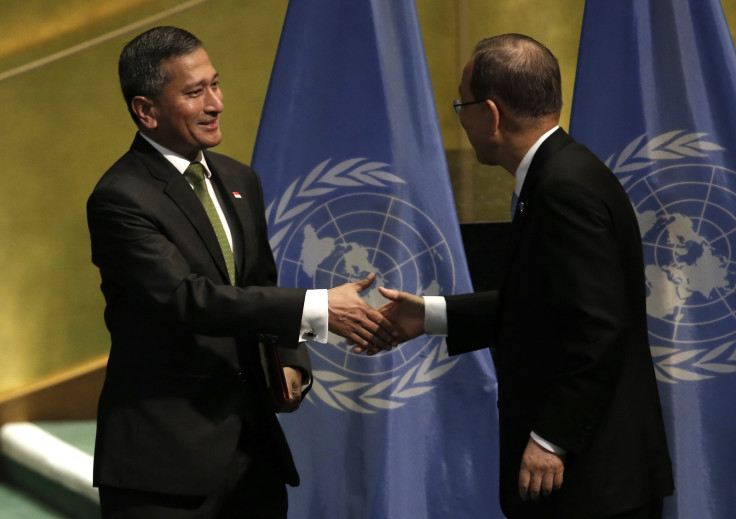Singapore tells world leaders to take balanced view as it defends death penalty
KEY POINTS
- Death penalty has deterred major drug syndicates from setting up in Singapore.
- Each state has sovereign right to choose most appropriate judicial approach.
Singapore has come out strongly backing capital punishment for drug-related offences, telling world leaders to respect the alternative views held by other countries. The city-state held itself up as a poster-boy for the effectiveness of the capital punishment deterrent, saying it has helped keep the nation drug-free and safe.
Speaking at a meeting taking place on the sidelines of the United Nations General Assembly in New York on Wednesday, 21 September, Singapore's Foreign Minister Vivian Balakrishnan urged world leaders to take a more balanced assessment of the death penalty.
"We do not have slums, we do not have ghettoes, we do not have no-go zones for the police. The death penalty has deterred major drug syndicates from establishing themselves in Singapore, and successfully kept the drug situation under control."
"This debate is a heated, painful and emotional one but I just ask members ... to respectfully reflect on the views expressed, the diversity of the circumstances and the impact on the ground. And to give each state its sovereign right to choose the most appropriate judicial approach so that we can adopt a more balanced perspective on this complex issue," he said.
The Straits Times noted that speakers at the panel had placards stating #EndExecutions.
UN Secretary-General Ban Ki-moon, in his opening speech at the meeting, had called on all countries to stop meting out capital punishment. "The world reached a major turning point in 2007 when the general assembly called for a worldwide moratorium. Since then the movement against capital punishment has been growing," he said.
Not directly referring to the spate of vigilante executions of drug offenders in the Philippines following newly-elected President Rodrigo Duterte's fight against illegal drugs, Ban said: "I am gravely concerned that some countries are suddenly resuming executions. Others are considering reintroducing the death penalty. We have to keep up the fight for the right to life."
Both the Philippines and Turkey are considering imposing the death penalty on certain crimes.
While not disagreeing that all human life is sacred, Balakrishnan said: "The immediate question that confronts all of us, whether within or without this room, is whether the death penalty, within the proper context, and in strictly limited circumstances, plays any role in protecting the sanctity of life."

Death penalty key in keeping Singapore safe
The minister outlined Singapore's approach to the use of the death penalty and why it continues to remain on its statute books. He said that the death penalty is applied "strictly in the context of an unwavering commitment to the rule of law ... resting on a strong and independent judiciary, there must be fair, transparent laws and due process."
He argued that the way Singapore has implemented its judicial system "has been pivotal in our efforts to foster a peaceful, safe, harmonious and inclusive society."
Balakrishnan added that capital punishment meted out to drugs-related offences and murder "has been a key element in keeping Singapore drug free and keeping Singapore safe. Singapore is probably one of the few countries in the world which has successfully fought this drug problem."
He continued: "We do not have slums, we do not have ghettos, we do not have no-go zones for the police. The death penalty has deterred major drug syndicates from establishing themselves in Singapore, and successfully kept the drug situation under control."
"For what it is worth, I can stand here and tell you that Singapore is one of the safest countries in the world. Our residents, including women and children, can go anywhere they please, freely and without fear, at any time of the day or night."
While there was strong support from Singaporeans for the death penalty, he said: "From time to time we will continue to review our legislation and make changes, according to our circumstances."
© Copyright IBTimes 2025. All rights reserved.






















